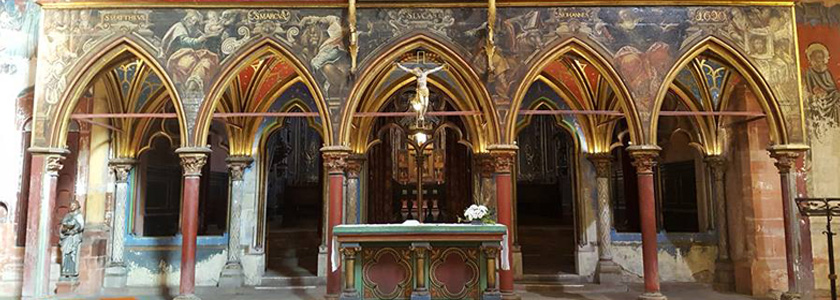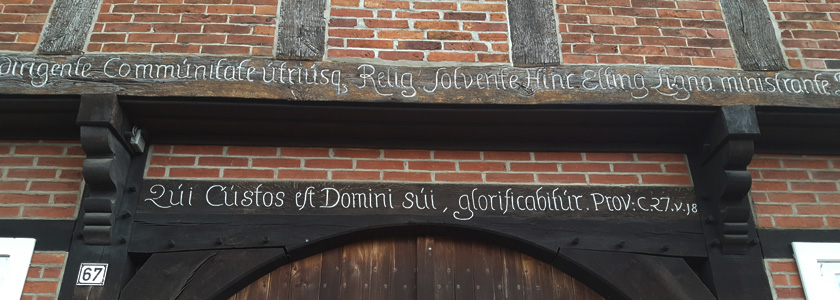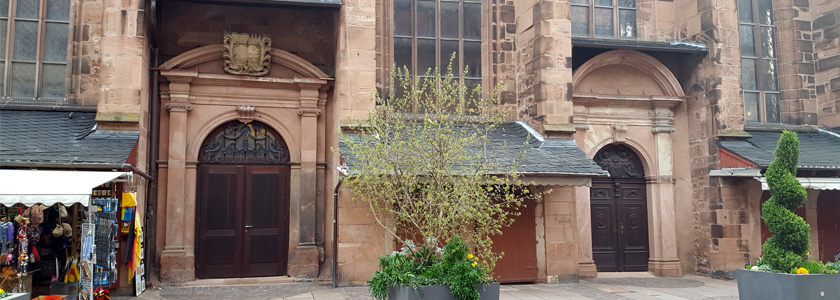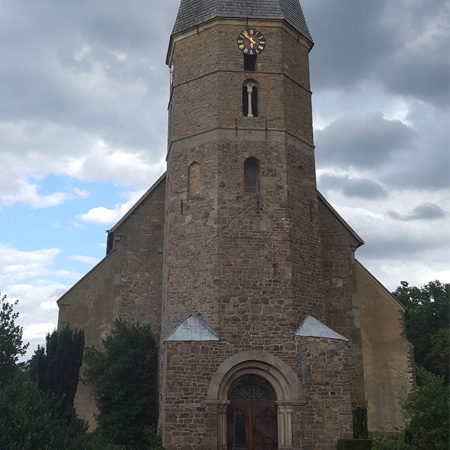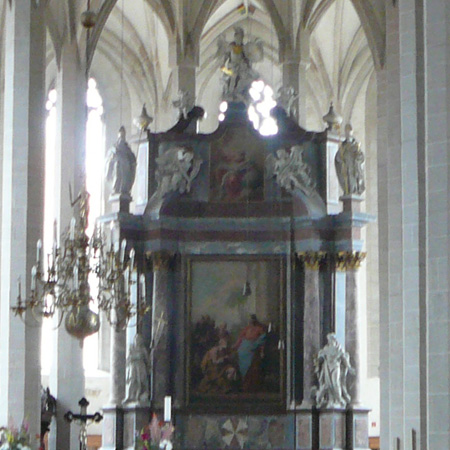How do people of different religions live together in peace?
This website is dedicated to churches that were shared between two or more Christian religions – Catholic, Lutheran, or Reformed. The oldest were established in the mid-1500s; eventually, their number grew to nearly 1,000; some 120 still exist today. Together, the shared churches of Europe open a window on the lives of ordinary people in pre-modern times, their beliefs and religious identities, and how they experienced diversity and toleration in everyday life – its rituals and celebrations, but also its conflicts and politicking. As such, the “Shared Churches of Europe” offers a prehistory of religious pluralism and coexistence, the conditions that made them possible, and the everyday practices that sustained them for generations, even centuries.
News and Events
Sixteenth Century Society and Conference, Albuquerque, NM, 1-4 November 2018. Sessions Co-Organized by the SCP and the Division for Late Medieval and Reformation Studies Sharing Sacred Spaces I: The Challenges of Coexistence Chair: David M. Luebke - Sean Dunwoody, “The Challenge of Zeal in Sixteenth-Century Augsburg” - Ute Lotz-Heumann, “‘He found an old priest in the church’: Shared Religious Spaces, Conflict, and Accommodation in Early Modern Ireland” - Peter Wallace, “Sacral Landscape in Urban Space: Confessional Relations at Colmar under French Sovereignty, 1673-1720” Comment: Marc Forster
Sharing Sacred Spaces II: Transformations of Confessional Regime Chair: Jesse Spohnholz - Emily Fisher Gray, “Rejecting Neighborliness: The Failure of Simultaneum in Augsburg” - David M. Luebke, “From Hybridity to Simultaneum: The Role of Casualia” - David Mayes, “The Late, Strange Career of Simultaneum: Upper Hesse in the Era of Evangelical Union” Comment: Randolph C. Head |
Ecclesiastical History Society Conference: The Church and the Law, Cambridge, UK, 23-25 July Communications 2 Chair: Marjorie E. Plummer (Old Parlour) - Martin Christ, “How to Divide a Church: The Early History of Bautzen’s Simultaneum” - Stephen Lazer, “The Changing Nature of the Simultaneum in Alsace” - Róisín Watson, “Altar Wars: Sharing Church Space in Eighteenth-Century Württemberg” |
Marjorie Elizabeth Plummer was awarded a Faculty Seed Grant by Research Development (RII) at the University of Arizona to work on Phase 1 of the “Shared Churches Project.” |
Marjorie Elizabeth Plummer, “Negotiating Mixed Religious Identities and Maintaining Devotional Communities in North German Pluriconfessional Convents, 1548–1595,” Workshop on “Religious Women during Reform and Reformation,” University of Tübingen, Germany, 22-24 May 2019 |
Marjorie Elizabeth Plummer presented a paper, “Ringing Bells and Singing Hymns: Religious Fluidity, Hybridity, and Conflict in the Devotional Cultures of North German Convents,” at the Forschungskolloquium zur Geschichte der Frühen Neuzeit (Research Colloquium on Early Modern History) at the Freie Universität Berlin (Free University of Berlin), Berlin, Germany, 5 February 2019 |
David M. Luebke, “Ecclesiastical Courts, Aristocratic Kinship, and Confessional Ambiguity: Osnabrück, Paderborn, Münster, ca. 1555-1620” German Studies Association, 43rd annual conference, Portland, Oregon, 3-6 October 2019. |
Marjorie Elizabeth Plummer was a visiting professor at the Research Group, “Interconfessionality in the Early Modern World,” at the University of Hamburg. During her stay, she taught a seminar, “Contested and shared sacred spaces in early modern Europe and the world.” For more on the “Interconfessionality” Research Group: https://www.gwiss.uni-hamburg.de/en/einrichtungen/graduiertenschule/interkonfessionalitaet.html. |
David M. Luebke presented “Imperial Law and the Rites of Passage: Litigating the Societal Functions of the Parish, 1550-1750” at the Sixteenth Century Society and Conference, Baltimore MD held 29 October-1 November 2020 [canceled due to the coronavirus pandemic] |
Marjorie Elizabeth Plummer, “Litigious Abbesses: Using the Imperial Court Cases to Protect Cuius regio, eius Religio in Pluriconfessional Convents in Germany, 1555-1590” Sixteenth Century Society and Conference, Baltimore MD, 29 October-1 November 2020 [canceled due to the coronavirus pandemic] |
David M. Luebke, “Gemeinde, Begräbnis, und die gemeinsame Nutzung des Kirchhofes während der Konfessionalisierung (1650-1720) [“Confessionalizing the Churchyard: Community, Burial, and Ecclsial Sharing, 1650-1720],” “Frühneuzeitliche Kulturen des Todes; Friedhöfe, Begräbnisse und Memoria in Mitteleuropa, ca. 1500-1800 / Early Modern Cultures of Death: Graveyards, Burials, and Commemoration in Central Europe, c. 1500-1800,” Czech Academy of Sciences, Charles University (Prague, CZ), 26-28 March 2020 [canceled due to the coronavirus pandemic] |
Marjorie Elizabeth Plummer presented a paper “Trouble in Paradise: Monastic Reform in Mixed Confessional Convents in the Seventeenth Century” at the digital workshop, “Gotteshäuser? Monastische Reform(ation) und ihr Nachleben,” held by the Interconfessionality Research Group at the University of Hamburg, 12-13 November 2021. |
Andrew Spicer gave a talk, “‘Chancel’ or Private Property? Reflections on the Fitzalan Chapel Case (1879)" a talk sponsored by the Society of Antiquaries at the Burlington House, London on 16 December 2021. To view lecture: https://www.youtube.com/watch?v=gqmI3f3kgdg&list=PLGOCpw7BaRwVGskVrqXlYT5oQxxQ9xgx3&index=13. |
Sixteenth Century Studies Conference, San Diego, CA, 28-31 October 2021. Sessions Co-organized by SCP Project with the University of Hamburg Measured Time: Trans- and Interconfessional Perspectives on Order and Disorder I Chair: Joel Harrington (Vanderbilt University) - Marie Cezanne (Ph.D. Candidate, Romance Literature, University of Hamburg), “Restitution of God`s Order in the Postlapsarian World: Penance in order to Achieve Eternal Salvation” - Sophie Rüth (Ph.D. Candidate, Art History, University of Hamburg), “Images and the Ephemerality of Peace: Conceptions of an Interconfessional Future in Allegorical Print Series based on the Antwerp Ommegang of 1561” - Leonid Malec (Ph.D. Candidate, History, University of Hamburg) “Re-ordering the Postlapsarian Body: Clocks and Clock Devotions in Early Modern Piety”
Disrupted Communities: Trans- and Interconfessional Perspectives on Order and Disorder II Chair: Joel Harrington (Vanderbilt University) - Anna-Aline Murawska (Ph.D. Candidate, German Literature, University of Hamburg), “Staging Chaos to Negotiate Chaos: Doing Reformation by Carnival Plays in 16th Century Bern?” - Marlon Bäumer (Ph.D. Candidate, History, University of Hamburg), “Chicken-houses, Papists, and Concord: Order and Disorder in Lutheran Monasteries of 16th century Lower Saxony” - Benjamin Miller (Ph.D. Candidate, History, University of Arizona), “Congregations on the March: The Disruptions of Military Chaplains and their Congregations in Mixed Confessional Communities in Hesse-Kassel” |
Marjorie Elizabeth Plummer presented a paper “Religious Diversity and Shared Religious Spaces in ‘Lutheran’ Churches” at the "Reformation Conference: Religion, Politics, and Society" hosted by The Gould Center at Claremont McKenna College, 24-26 Feb 2022 [Postponed from September 2020] |
Andrew Spicer gave the keynote talk, “From Chalices to Drinking Cups? The Material Culture of the Eucharist,” at the Symposium, “Moving Objects: Inter-and Transconfessional Perspectives on Early Modern Material Culture,” University of Hamburg, 1-3 July 2022. |
Marjorie Elizabeth Plummer presented a paper, “Removing Organs, Sharing Altars: Contested and Shared Objects in Pluriconfessional and Mixed Confessional Convent Choirs in Germany, 1600–1745,” at the Symposium, “Moving Objects: Inter-and Transconfessional Perspectives on Early Modern Material Culture,” University of Hamburg, 1-3 July 2022. |
Andrew Spicer has been awarded a 2022/2023 Research Excellence Award from Oxford Brookes University to develop research collaborations for the Shared Churches Project with German colleagues and institutions during the next academic year. |
The University of Arizona was awarded an NEH Collaborative Research Grant for Shared Churches Project for 2023-2025. Marjorie Plummer, project director, will be working with Chris Lukinbeal and Bryan Heidorn at the University of Arizona and with project research team members David Luebke (Oregon) and Andrew Spicer (Oxford Brookes) to develop an interactive map and searchable web-based database of shared churches for the Shared Churches Project. |
David M. Luebke presented a paper, “The Little Lutherans Who Could: Justus Moser, Enlightened Monarchy, and the Failure of Simultaneum in Furstenau, 1787–1802,” at the German Studies Association in Houston, TX on September 16, 2022.
|
Sharing Spaces: Cultural and Spatial Interactions within and beyond German-Speaking Europe, FNI Conference to be held at the University of Arizona, Tucson, AZ, 2-4 March 2023 |
Footer menu
© 2021 The Arizona Board of Regents on behalf of The University of Arizona
